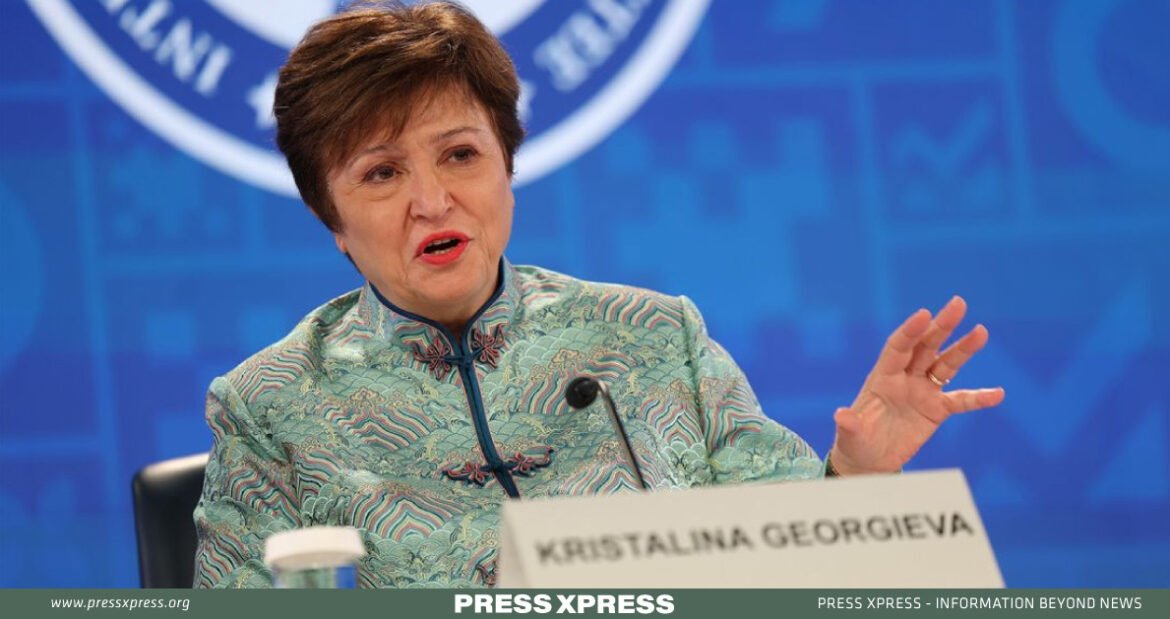In a recent statement, the leader of the International Monetary Fund highlighted the urgent need to tackle the immense gap between the haves and the have-nots. Kristalina Georgieva stressed that the key to uplifting our global community’s well-being by ninefold in the coming century rests on our determination to break down the walls of inequality that stand in our way.
You Can Also Read: UNHCR Imploration for $852.4m Support to Rohingyas Refugees in Bangladesh!
Echoing a solemn duty incumbent upon world leaders, Georgieva illuminated the imperative of fashioning an economy that not only grapples with the specter of climate crisis but also harnesses the potential of AI ethically while carving a relentless path toward equitable distribution of wealth. “We have an obligation to correct what has been most seriously wrong over the last 100 years – the persistence of high economic inequality,” she asserted, inspiring her words with a sense of urgency tempered by the gravity of responsibility.
Georgieva’s Appeal: Echoes of Keynes in a Modern Age
Drawing parallels with history’s crucibles, Georgieva painted a vivid tableau of the present moment as akin to the epochal crossroads of the Great Depression, evoking the prophetic wisdom of 20th century’s economist John Maynard Keynes. In a poignant juxtaposition, she juxtaposed Keynes’s visionary foresight with the harsh realities of contemporary inequity, underscoring how the promise of technological advancement had been tarnished by the shadows of disproportionate wealth accumulation.
“We have an obligation to correct what has been most seriously wrong over the last 100 years – the persistence of high economic inequality.”
– Kristalina Georgieva, Managing director of the International Monetary Fund

Georgieva deftly dissected Keynes’s optimism, exposing the rift between his lofty projections and the stark inequalities that persist unabated. She lamented how the fruits of progress had been hoarded by the privileged few, echoing Keynes’s optimism while casting a discerning gaze on the gaping disparities within and among nations. “He [Keynes] was also too optimistic about how the benefits of growth would be shared. Economic inequality remains too high, within and across countries,” she solemnly intoned, punctuating her discourse with a poignant reminder of the unfinished struggle for economic justice.
Charting Humanity’s Path for the Next Century
Presenting a canvas painted with two distinct futures, meticulously crafted by the minds at the IMF, Georgieva unveiled a dichotomy that will define the trajectory of human progress over the next century. With a steady hand, she outlined the contours of a ‘low ambition’ path, where the global economy would swell to threefold its current size, offering a mere doubling of living standards—a vision anchored in complacency, devoid of the transformative zeal needed to propel humanity forward.
Yet, amidst the shadows of mediocrity, a beacon of hope emerged in the form of a ‘high ambition’ scenario—a bold vision for a world where sustainability and equity reign supreme. Here, she painted a portrait of a global GDP soaring to thirteen times its current magnitude, accompanied by a ninefold surge in living standards—a vision that transcends the mundane confines of the status quo, beckoning humanity to reach for the stars.
As she embarked on her impassioned plea, Georgieva summoned world leaders to heed the clarion call, directing their focus towards three pivotal realms: combating the climate emergency, embracing transformative technologies like AI, and eradicating the scourge of inequality. In her fervent appeal, she underscored the imperative of recalibrating our metrics of wealth, urging a paradigm shift that encompasses the value of nature, humanity, and societal cohesion.
“In the long run, we are all dead.”
– John Maynard Keynes, founder of modern macroeconomics.

With a profound nod to Keynes’s timeless wisdom, she invoked his emotional reminder that “in the long run, we are all dead,” infusing her discourse with a sense of urgency tempered by the promise of possibility. For Georgieva, Keynes’s words were not merely a reflection on mortality but a rallying cry—a summons to seize the fleeting moments of today to craft a tomorrow imbued with promise and prosperity.
Evidence Shatters Myths on Inequality and Growth
By amalgamating a plethora of policy interventions meticulously outlined in this discourse, we can orchestrate a symphony of economic harmony wherein income distribution and efficiency dance hand in hand. Despite the dissenting voices from influential quarters, such as the Robert Lucas school of thought at the University of Chicago, it has become resoundingly clear that addressing inequality is not antithetical to sound economic principles. On the contrary, empirical evidence illuminates a path where inequality-reducing measures not only rectify distributional disparities but also amplify economic efficiency, foster labor participation, and fortify personal freedoms by expanding individual opportunities.
Through direct transfers, behavioral incentives, and a steadfast commitment to prioritizing the welfare of the marginalized, these interventions not only bridge the chasm between equity and efficiency but emerge as linchpins in fostering an environment conducive to robust economic growth. Yet, amidst the chorus of optimism, lurk the shadows of potential pitfalls—underscoring the critical importance of meticulous policy design in determining the fate of these endeavors.
For the lessons distilled from this wealth of evidence yield four cardinal truths: economic growth and inequality reduction need not be mutually exclusive; proven methodologies exist to achieve both in tandem; meticulous policy design is paramount; and the imperative to combat poverty and inequality transcends geopolitical boundaries and economic circumstances.
Lessons from IMF Research:
- Addressing inequality is not antithetical to sound economic principles.
- Inequality-reducing measures amplify economic efficiency, foster labor participation, and fortify personal freedoms.
- Direct transfers, behavioral incentives, and prioritizing the welfare of the marginalized are crucial.
Yet, in our pursuit of equity, we are bound to encounter resistance—often stemming from the entrenched interests of the elite. Thus, realizing the lofty aspirations of the Sustainable Development Goals demands unwavering political will and steely determination to enact and uphold these policies, even in the face of formidable opposition.
The Cost of Inequality and the Promise of Growth
Despite numerous studies delving into this complex relationship, the definitive answer to how household income inequality influences a nation’s growth trajectory remains elusive, both theoretically and empirically.
In general terms, there is a noticeable negative correlation between inequality levels and economic growth. However, it’s important to note that correlation does not imply causation—a principle deeply ingrained in economic discussions.
Mid-20th-century theoretical discussions suggested that inequality could stimulate growth through two key mechanisms. Firstly, by encouraging greater investments in labor and capital among the affluent, thus enhancing productivity. Secondly, by promoting higher savings and investments from wealthy individuals, driving economic expansion.
Recent insights from the IMF present a concerning picture: a mere 1 percentage point increase in the income share of the top 20% results in a 0.08 percentage point decrease in GDP growth over five years, while a similar increase among the bottom 20% leads to a 0.38 percentage point growth surge.
Similarly, the OECD’s research highlights the detrimental impact of inequality, with a mere three-point rise in the Gini coefficient correlating with a 0.35 percentage point annual reduction in growth, equivalent to an alarming 8.5% GDP loss over 25 years.
Empirical Evidence:
IMF Insights:
- 1% increase in income share of wealthiest 20% leads to 0.08% decrease in GDP growth over 5 years.
- Corresponding increase among poorest 20% leads to 0.38% increase in growth.
OECD Findings:
- Three-point increase in Gini coefficient results in 0.35% annual erosion of growth, totaling 8.5% loss of GDP over 25 years.
Therefore, it’s evident that within the realm of economic inquiry, one clear truth stands out: while inequality may be a persistent feature of modern economies, its alleviation, particularly among the most marginalized, not only signifies a victory for social justice but also fosters economic growth.


